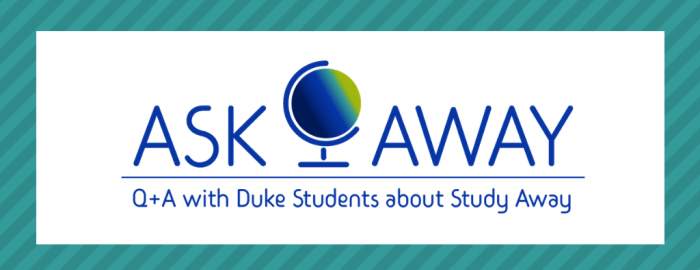Myth #1: I will not receive major, minor, or certificate credit or fulfill any of my graduation requirements.
When you study on Duke-In programs you earn Duke credit or a combination of Duke credit and transfer credit. Duke courses taken abroad fulfill the same requirements as on-campus courses.
When you study on Duke-Approved programs (or Duke-In hybrid programs that include transfer credit), you should consult the Director of Undergraduate Studies in your major department to find out if, and how many, transfer credits may be applied towards your major. Transfer credit can still allow you to fulfill some major, minor, and certificate requirements as well as Areas of Knowledge requirements.
Successful competition of a semester study away program will in any case allow you to receive four credits that will count towards graduation requirements.
Myth #2: I need to be fluent in a foreign language in order to study in a country where the native language is something other than English.
Sure, study away is a perfect way to use or improve existing language skills. But for everyone else, there are other ways to approach studying in a country where English is not the native language:
Study in English: One option is to choose a program taught in English. You can take a variety of subjects in many countries—even countries where English is not the native language. For example, you can study psychology in the Netherlands, environmental science in Italy, or engineering in Germany.
Learn the language while you’re there: You can fulfill your language requirements on Duke-In and Duke-Approved programs in a country where the target language is spoken (i.e., French in France or Senegal, Spanish in Spain or Argentina). If you study a language on a Duke-Approved program you will have to request foreign language (FL) coding for your language courses taken abroad, just as you would have to request Modes of Inquiry coding for any transfer course.
Myth #3: I cannot use financial aid to help pay for my summer, semester, or academic year program abroad.
If you receive financial aid during the academic year, you are eligible to apply for financial aid for up to two Duke-In summer study away programs (and/or summer sessions in Durham). This aid is offered in addition to the eight basic academic-year semesters of financial aid.
Financial aid is also available on a semester basis for the full program budget of Duke-In and Duke-approved programs. The costs under consideration include: tuition and fees, housing, meals, books and supplies, visas and vaccinations, airfare, and other personal expenses.
- If you receive financial aid at Duke and decide to participate in a Duke-In program, your cost will remain the same as a semester on campus, even if your program is more expensive.
- If you decide to participate in a Duke-approved program, you will receive financial aid for your study away experience in the same proportion as for your studies on campus, but never more than your financial aid at Duke. In this case your family contribution will remain the same, provided the cost of the program doesn't exceed the cost of a semester at Duke.
Myth #4: I can only study away once.
An increasing number of students want to experience more than one region or program. For this reason, you can decide to participate in more than one study away program during your time at Duke.
The best way to fit in multiple study away programs is to meet with your academic advisor and plan your academic schedule early. Look for ways to satisfy course requirements on study away programs!
Here are some patterns you might consider:
- Study away in the summer and also enroll in a semester program
- Enroll in two summer study away programs
- Spend one semester on a program and a second semester on a different program, in a different location
- Study away for a semester, and while still away, decide to extend to a full academic year
Myth #5: I can only study away if I am majoring in the humanities or social sciences.
There are several programs and locations with engineering and science classes, as well as science themes. We recommend discussing your interests and options with a study away advisor. The Global Education Office website includes a list of all the approved programs, with links to those programs that generally include the academic courses available. Another resource is the Course Approval Database. This Database lists courses that have been approved and is searchable by department, country, and program. This is NOT a comprehensive list of available courses. It represents only those courses that have been approved. Additional courses can be approved by working with Cathy Penny. She works in conjunction with departmental Directors of Undergraduate Studies to obtain course approvals.
Myth #6: Studying away in the spring is not an option.
Although traditionally more Duke students decide to study away on a summer program or during the fall of their junior year, these might not be the best options for you. You should assess your own personal needs and academic goals and decide when is the best time for you to study away. Students can study away for a semester even during their sophomore year, and we strongly encourage you to consider a spring semester away. You might find that studying away in the spring might give you the opportunity to take courses abroad that you were not considering or give you more flexibility with your academic schedule at Duke.








